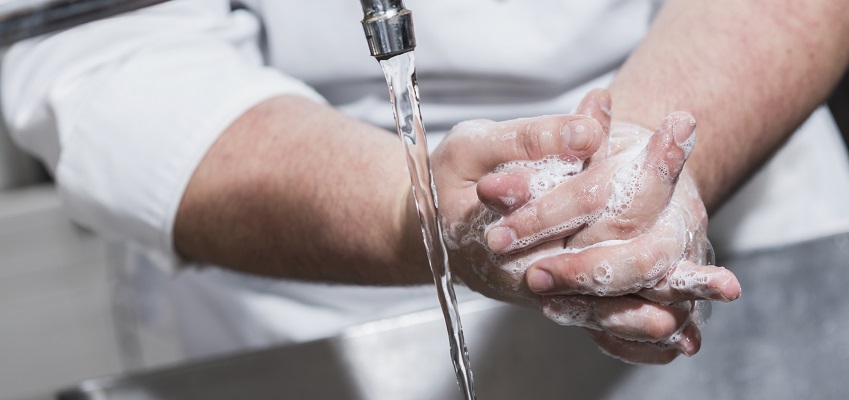Keeping it clean: Personal hygiene’s role in food safety

It’s important for food handlers to know how to keep their hands clean throughout their shifts.
Foodborne pathogens can attach to skin and hair, and there’s a far greater risk of transferring pathogens onto food and equipment if a food handler doesn’t follow a personal hygiene program.
Showering or bathing before work is the only way to effectively establish a good hygiene routine and should be considered a requirement for all food handlers.
Practicing good personal hygiene includes maintaining clean hands and nails. Make sure your staff’s fingernails are trimmed, filed, and free from nail polish or false nails. It’s also important for food handlers to keep their hands clean throughout their shifts by knowing when, where, and how to wash hands and wear gloves.
Work attire
Not only does dirty work attire make a poor impression on guests, it also puts their health at greater risk. Dirty, unwashed clothing has an increased risk of carrying pathogens that can be transferred onto food and cause foodborne illnesses.
What makes clean work attire so important is that dirty clothing doesn’t even have to come into direct contact with the food, as the pathogens can easily transfer from the clothing to the hands and to the food.
Establish a dress code that includes standards for the cleanliness of work attire. Examples of guidelines include:
- Wear clean clothing daily.
- Change soiled uniforms, including aprons, as necessary.
- Recommend changing into work clothes at work.
- Store personal belongings such as street clothing, backpacks, electronic devices, and keys in designed areas that do not interact with food.
- Keep dirty clothing such as aprons, chef coats, and uniforms in an area that is away from food and prep areas.
- Wear a clean hat or hair covering when prepping food, working in prep areas, or working in areas used to clean utensils or equipment. Wear a beard covering when necessary.
- Remove rings, bracelets, and other jewelry that could contaminate or fall into food.
The importance of personal hygiene
Transferring pathogens from one’s body (especially hands) to food is the leading cause of foodborne-illness outbreaks at restaurant and foodservice operations. Neglecting personal hygiene significantly increases the chances of transferring harmful pathogens onto food. Prioritizing personal cleanliness is one of the best ways to protect the health of your guests.
Cracking the code on food safety
Check back next week when we take a look at what health inspectors will want to see to ensure your establishment remains safe and compliant. Also, make sure to check out last week’s coverage on temperature and food safety, which includes a link to an eBook.
The Association is also offering 20% off select ServSafe certifications and trainings, including our ServSafe Manager, ServSafe Food Handler, and ServSafe Allergens certification courses all month long! Crack the code on effective food safety with industry-leading training developed by the nation’s most trusted restaurant resource.